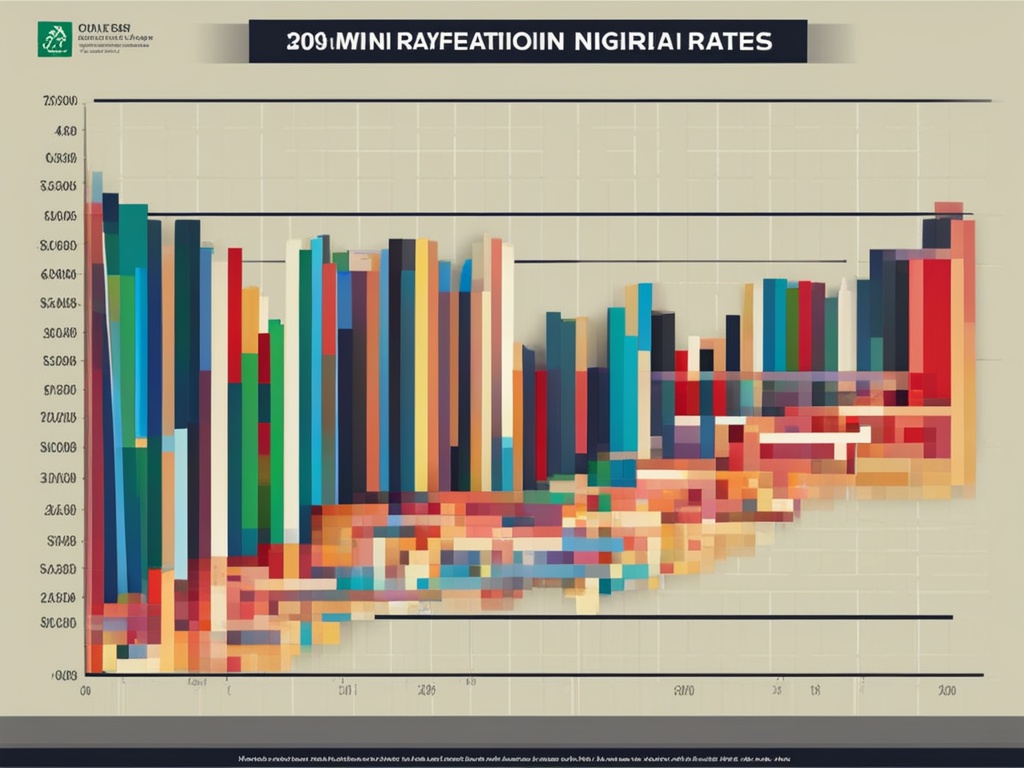
Inflation Rate in Nigeria
Nigeria, the biggest economy in Africa, faces ongoing inflation issues. The inflation rate in Nigeria is a big worry, affecting businesses, consumers, and the economy. This guide will look into the current state of inflation in Nigeria, its causes, and how the government and the Central Bank of Nigeria (CBN) are tackling price stability.

Knowing how inflation in Nigeria works is key. It impacts how much people can buy, how much businesses make, and the country’s economic growth. This piece will cover what drives inflationary pressures, the consumer price index (CPI) and cost of living in Nigeria, and how exchange rate changes affect the economy. It will also look at the monetary policy steps the CBN takes to keep price stability and control the inflation rate in Nigeria.
What is Inflation and Its Impact on the Nigerian Economy
Inflation means prices go up over time. In Nigeria, inflation rate in nigeria is a big worry. It affects both businesses and people. Knowing why and how inflationary pressures nigeria happen helps us deal with the nigerian economy.
Understanding Inflation and Its Causes
The consumer price index nigeria shows how prices change. Things that make inflation rate in nigeria go up include:
- Supply chain problems and shortages of important items
- Changes in the exchange rate naira making prices in nigeria go up
- More people wanting goods and services than there are available
- Higher costs for making and moving goods
The Effects of High Inflation on Businesses and Consumers
High inflation has big effects on the nigerian economy. Companies find it hard to stay profitable as cost of living nigeria goes up. This means higher costs and less money for consumers to spend.
Consumers also face hard times trying to keep their standard of living. Their real incomes go down because they can buy less with their money.
The effects of inflationary pressures nigeria touch many parts of the economy. This includes investment, spending, and growth. It’s important for leaders, companies, and people to understand these issues to manage the nigerian economy.
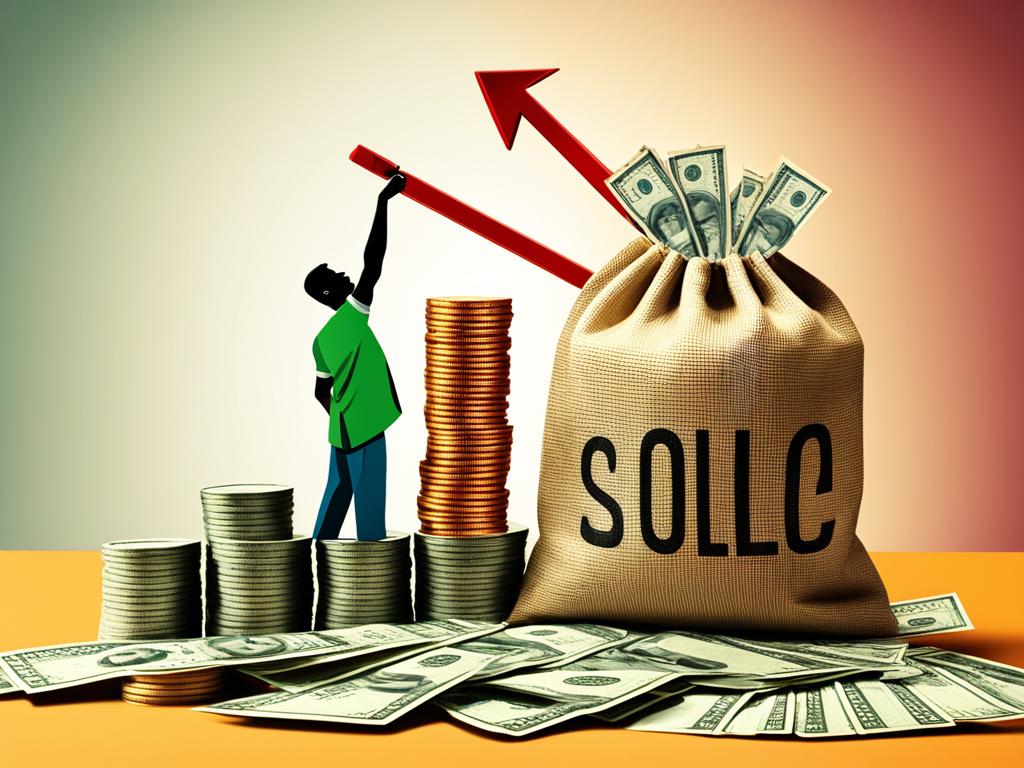
Inflation Rate in Nigeria: Historical Trends and Current Situation
Nigeria, the biggest economy in Africa, has seen ups and downs in its inflation rate over time. It’s important for businesses and consumers to know the history and current state of inflation in the country.
The inflation rate in Nigeria has worried policymakers and economists. The Nigerian Bureau of Statistics shows the consumer price index (CPI) has changed a lot in the last ten years.
| Year | Inflation Rate (%) |
|---|---|
| 2012 | 12.2% |
| 2013 | 8.0% |
| 2014 | 7.9% |
| 2015 | 9.0% |
| 2016 | 15.7% |
| 2017 | 16.5% |
| 2018 | 12.1% |
| 2019 | 11.4% |
| 2020 | 14.9% |
| 2021 | 17.0% |
The data shows the Nigerian economy has been unstable, with the inflation rate going up and down. This high inflation rate has hurt consumers’ buying power and made it harder for businesses to make money.

Knowing about the inflation rate in Nigeria helps businesses and consumers make smart choices and plan for the future.
Factors Driving Inflationary Pressures in Nigeria
Nigeria’s economy has faced ongoing inflation for years. The consumer price index (CPI) and the cost of living are key factors. The exchange rate fluctuations of the Nigerian naira also affect prices.
Inflation Rate in Nigeria: Role of Consumer Price Index (CPI) and Cost of Living
The consumer price index (CPI) tracks changes in consumer goods and services prices. In Nigeria, the CPI has gone up, showing the rising costs of living. This has led to more inflationary pressures across the country.
Inflation Rate in Nigeria: Impact of Exchange Rate Fluctuations
The exchange rate of the Nigerian naira against currencies like the U.S. dollar affects inflationary pressures. Changes in the exchange rate impact imported goods and domestic production costs. This leads to higher prices in Nigeria.
| Indicator | 2020 | 2021 | 2022 |
|---|---|---|---|
| Consumer Price Index (CPI) | 13.2% | 17.0% | 16.8% |
| Exchange Rate (NGN/USD) | 380.66 | 410.95 | 435.00 |
| Inflation Rate | 13.2% | 17.0% | 16.8% |
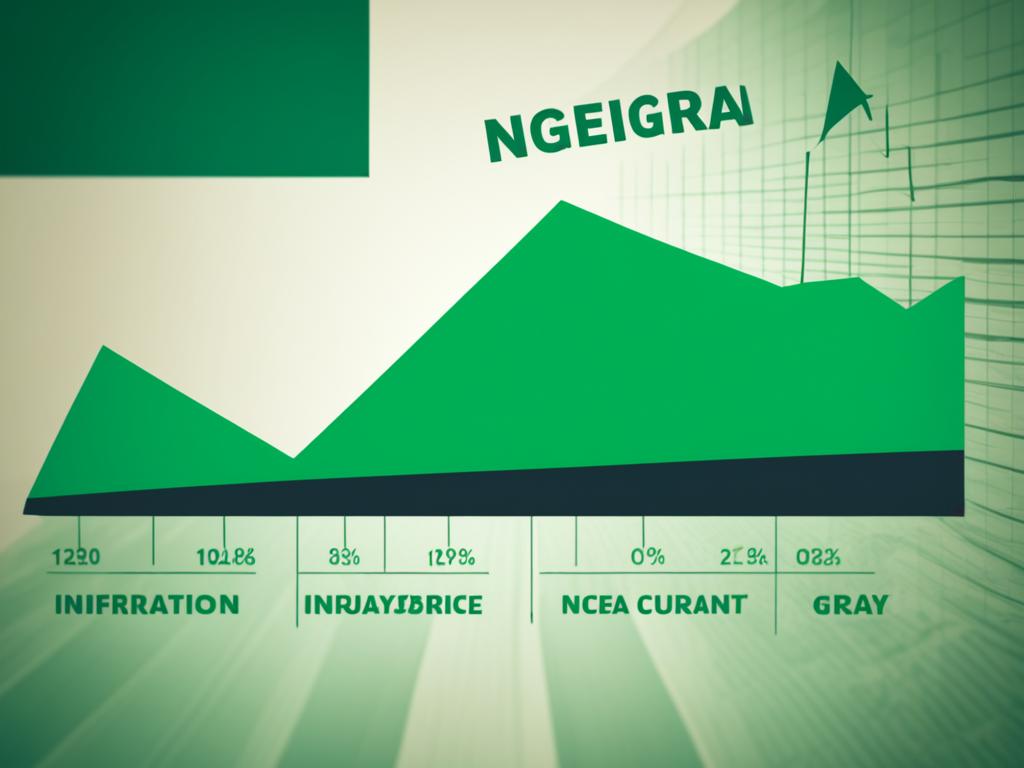
Monetary Policy and Inflation Targeting in Nigeria
The Central Bank of Nigeria (CBN) is key in fighting inflation and keeping prices stable. It uses different strategies and actions to control money supply and boost growth. This helps keep inflation at a good level.
Inflation Rate in Nigeria: The Central Bank of Nigeria’s Approach to Price Stability
The CBN’s main goal is to keep prices stable. It uses an inflation targeting method. This means setting a specific inflation rate and making policies to reach it.
This approach helps guide the public, businesses, and policymakers. It aims to make an environment for steady economic growth, investment, and financial stability.
The CBN uses tools like changing the Monetary Policy Rate (MPR) and open market operations. It also uses reserve requirements and other tools to manage money supply and credit conditions.
With these actions, the Central Bank of Nigeria works to balance price stability and economic growth. This supports the Nigerian monetary policy and inflation targeting goals.
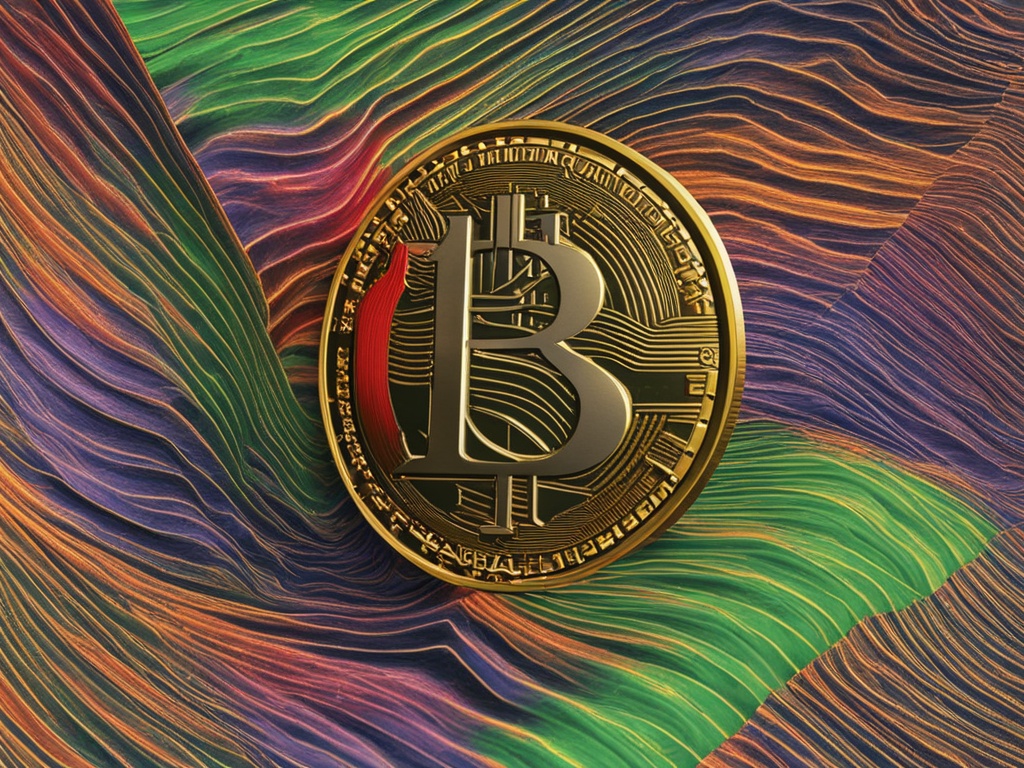
Inflation Rate in Nigeria: Implications for Consumers and Businesses
The high inflation rate in Nigeria affects both consumers and businesses. As prices go up, the cost of living in Nigeria increases. This means people have less money to spend on things they need.
Consumers face the issue of rising prices on many goods and services. This includes food, transport, housing, and utilities. Because of this, many Nigerians have to choose what to spend money on carefully.
For businesses, the inflationary environment is tough. They pay more for raw materials, labor, and transport. This makes it hard to keep profits up. Companies must find ways to stay competitive and adjust their prices to stay afloat.
Business investment in Nigeria is also affected by the high inflation rate. The uncertainty about the economy makes it hard to plan for the future. This can stop new investments, slowing down the growth of the Nigerian economy.
Policymakers in Nigeria need to understand how inflation affects everyone. They must work on reducing inflation to create a better economy for all Nigerians.
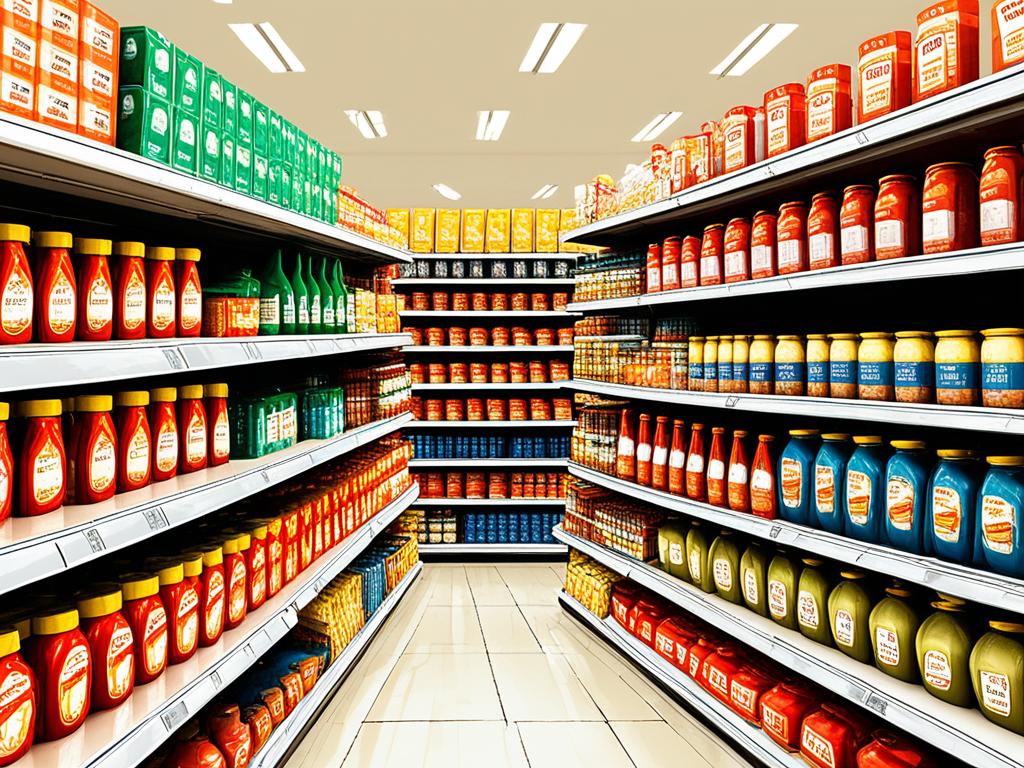
Conclusion
In conclusion, the issue of inflation in Nigeria is complex and needs a full solution. The inflation rate in Nigeria has been a big worry, affecting the Nigerian economy and people’s lives. It’s important to know what causes it, like the CPI and changes in exchange rates.
The Central Bank of Nigeria is working hard to keep prices stable with different policies. But, they need help from the government and other important people. Fighting inflation needs a plan that looks at Nigeria’s unique economic and social situation.
With the inflation rate in Nigeria still a big problem, the government and the central bank must work together. They need to make and carry out good policies to keep prices stable, protect what people can buy, and help the economy grow. By tackling this, Nigeria can create a better and stronger future for its people.
FAQ
What is inflation and how does it impact the Nigerian economy?
Inflation means prices go up over time. In Nigeria, it makes things cost more. This lowers what people can buy, makes businesses struggle, and hurts the economy.
What are the historical trends and current situation of inflation in Nigeria?
Nigeria’s inflation has changed a lot over time. Sometimes it’s high, sometimes low. Now, prices are going up a lot, making life more expensive for everyone.
What are the key factors driving inflationary pressures in Nigeria?
Many things cause inflation in Nigeria. Things like supply chain problems, changes in currency value, and more demand for goods. These things affect prices and inflation.
How does the Central Bank of Nigeria’s monetary policy and inflation targeting efforts aim to address the inflation challenge?
The Central Bank of Nigeria (CBN) fights inflation with special policies. They control money supply, manage currency value, and use interventions to help the economy grow and keep prices stable.
What are the implications of the current inflation rate for Nigerian consumers and businesses?
High inflation is tough for people and businesses in Nigeria. Consumers have less money to spend and pay more for things. Businesses face higher costs, smaller profits, and find it hard to invest.



The high inflation rate in Nigeria is really affecting everyone as the cost of living keeps rising day in day out. Less money is in circulation and it’s as affected various businesses as consumer fails to purchase goods due to high cost of price.
Thanks for shedding light on this critical issue. The high inflation rate is indeed affecting the average Nigerian’s purchasing power and standard of living